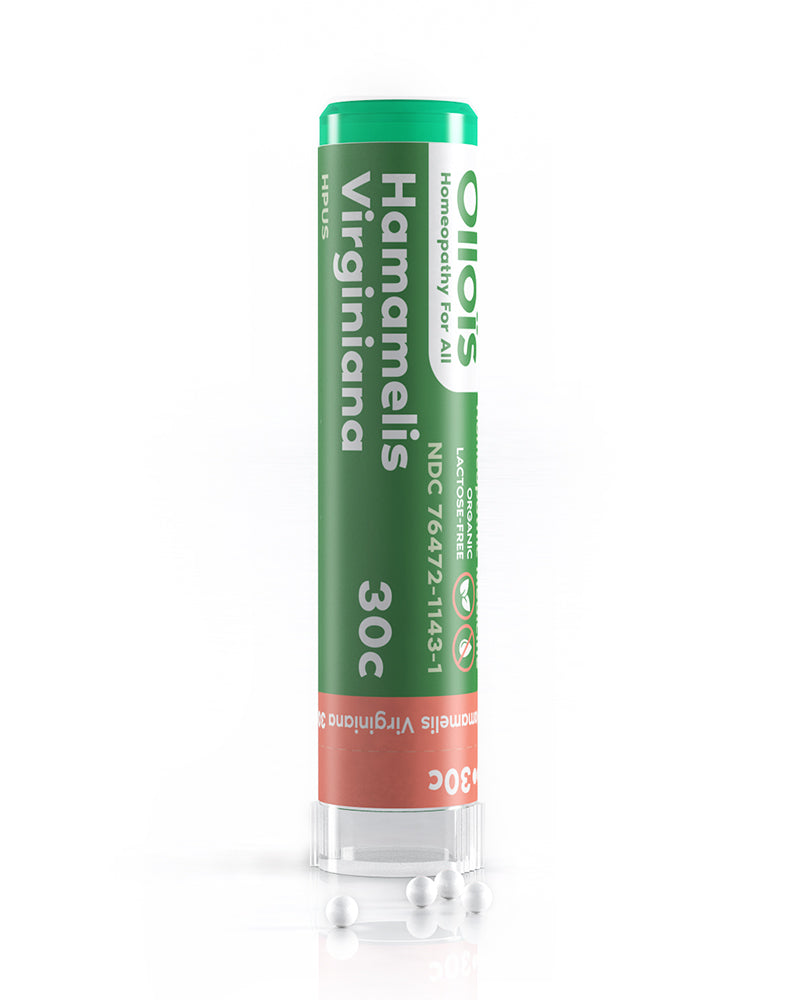Collection: Varicose Veins
Hamamelis Virginiana
Varicose veins are visibly swollen and twisted veins that are usually found on the legs and feet. A similar condition that often goes along with them are ‘spider veins’ – which are also referred to as superficial varicose veins. These are smaller and caused by flooded capillaries.
Most complaints about varicose veins are related to their appearance; but, for some, these can be painful. Symptoms also include achiness as well as itchiness, a burning sensation, or a throbbing feeling. Cramping and swelling in the lower legs could also be experienced. The inflammation of the veins can restrict circulation – this is what can cause the swelling and itchiness.
The root cause of varicose veins are damaged valves that prevent blood from flowing freely during its return to your heart. Muscle contractions in your legs help push blood back up to the centre of your body. These valves only let it flow in one direction – preventing the falling effect of gravity. When these valves become damaged, the blood can pool in the veins.
As we get older, the propensity for varicose veins increases. There is a genetic factor as well. If your family has a history of them, you’re much more likely to get them yourself. Being stationary for long periods of time, whether standing or sitting, can also be a contributor. This is because blood doesn’t flow as easily while stationary. And gender also plays a major role; females are more than twice as likely to have varicose veins than males.
To prevent and manage this, there is homeopathic medicine for varicose veins. Hamamelis-Virginiana-30c, a 100%-natural remedy from Olloïs, has been shown to help veins relax, allowing pooled blood to flow more freely. This can also help relieve the swelling and feeling of ‘heavy legs’ that can come with varicose veins.
To discover more natural, organic, and lactose-free remedies to help you feel at your best, check out the products page.
FAQ
What is Homeopathy?
Homeopathy is a medical practice based upon the body's ability to heal itself, and the principle that "like cures like" or the Law of Similars: that is, if a natural substance causes a symptom in a healthy person, a very small amount of the same substance may help relieve symptoms of the illness. Homeopathic medicines enhance the body's normal healing and self-regulatory process.
How do I take homeopathic medicines?
Homeopathic medicated pellets contain only a little of an active ingredient for treatment of disease. These are known as highly diluted or "potentiated" substances. Homeopathic medicines should be placed under the tongue of adults and children or in the cheek of an infant, where they will dissolve. It is preferable to take homeopathic medicines apart from meals. The dosage is not related to the weight and age of the patient. In general, dissolve 5 pellets 3 times a day until symptoms are relieved or as directed by your health Care Professional.
Is there evidence that Homeopathy works?
There are literally hundreds of high quality, published basic sciences, pre-clinical and clinical studies showing that homeopathy works. These studies have been published in respected journals like Lancet, Pediatrics, Rheumatology, and Annals of Internal Medicine, among others.
A great source of high quality research in homeopathy at an
international level is the Homeopathic Research Institute in the U.K. headed by physicist, Dr Alexander Tournier. Click below to learn more about their studies and rigorous methods.
Is Homeopathy regulated?
The U.S. Congress passed a law in 1938 declaring that homeopathic remedies are to be regulated by the U.S. Food and Drug Administration (FDA) in the same manner as nonprescription, over the counter (OTC) drugs.
Is Homeopathy new?
The Law of Similars has been known since at least the time of Hippocrates (ca. 400 B.C.), but it was doctor and chemist Samuel Hahnemann who fully stated the ideas of homeopathy in the early 1800's in Germany. He discovered the truth of the Law of Similars by testing small doses of medicine on himself. Although there is wider acceptance of homeopathy in countries such as France, Germany, Mexico, Argentina, India and Great Britain, we have seen a greater interest in homeopathic medicine in the USA recently. In fact, the family doctor to England's Queen Elizabeth is a homeopathic physician.
What is the difference between the dilutions?
30C dilutions are traditionally used in Homeopathy to address general and chronic symptoms.
200CK dilutions are usually recommended by healthcare practitioners when there is an emotional component associated with physical symptoms.
Which base ingredient do you use for your pellets?
Our pellets are made from Organic Beet Sucrose exclusively grown in Europe. We then impregnate the pellets with the homeopathic dilution of the remedy.
How to open our tubes?
Are Olloïs remedies HAS/FSA eligible?
Yes, Olloïs homeopathic remedies are eligible.

 Respiratory
Respiratory
 Stress & Sleep
Stress & Sleep
